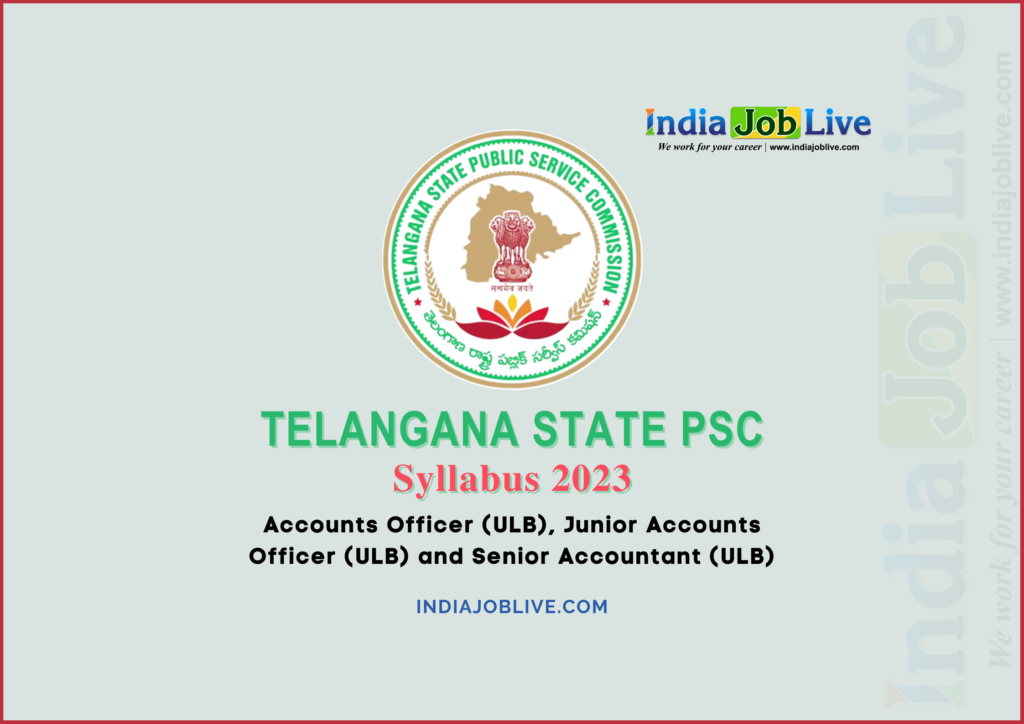TSPSC Accountant Post Syllabus 2023: Check Exam Syllabus and Exam Pattern the post of Accounts Officer (ULB), Junior Accounts Officer (ULB) and Senior Accountant (ULB)

TSPSC Accountant 2023 Syllabus
TSPSC Accountant 2023 Syllabus Notification: The Telanagana State Public Service Commission (TSPSC) is accepting applications from eligible Indians to fill 78 vacancies in the posts of Accounts
Officer (ULB), Junior Accounts Officer (ULB) and Senior Accountant (ULB) in Municipal Administration & Urban Development Department in the State of Telangana. The registration deadline is on 11 February 2023
TSPSC Accountant 2023 Exam Pattern
The TSPSC Accountant 2023 Written Exam will consist of 300 questions divided into two sections:
Paper 1 – General Studies and General Abilities (150 Questions)
Paper 2 – Commerce (Degree Level) (150 Questions)
Each question will be worth one mark and the duration of exam is 150 minutes for each Paper. The language of the exam wil be bilingual i.e., English and Telugu
TSPSC Accountant 2023 Syllabus
PAPER-I: GENERAL STUDIES AND GENERAL ABILITIES
1. Current Affairs – Regional, National and International.
2. International Relations and Events.
3. General Science; India’s achievements in Science and Technology.
4. Environmental issues and Disaster Management.
5. Economy of India and Telangana.
6. Geography of India with a focus on Telangana.
7. Indian Constitution and Polity with a focus on local self Government.
8. Society, Culture, Heritage, Arts and Literature of Telangana.
9. Policies of Telangana State.
10. History of Modern India with a focus on Indian National Movement.
11. History of Telangana with special emphasis on Movement for Telangana Statehood.
12. Logical Reasoning, Analytical Ability and Data Interpretation.
13. Basic English.
PAPER-II: COMMERCE (DEGREE LEVEL)
1. Accounting — Meaning and Definition – Book-keeping and Accounting – Accounting concepts and conventions- Indian Accounting StandardsClassification of Accounts – Rules of Double Entry System – Accounting Process : Journal, ledger, balancing- Trial Balance, Final Accounts of a sole trader.
2. Subsidiary Books and Bank Reconciliation Statements – Errors and Rectification – Depreciation.
3. Accounts from Incomplete Records – Joint Venture Accounts- Consignment Accounts – Accounts for Non Profit Organizations.
4. Partnership Accounts – Partnership Deed- Capital Accounts (Fixed and Fluctuating) – Admission, Retirement and Death of a Partner – Insolvency of a Partner- Dissolution of Firm.
5. Advance Accounting – Valuation of Goodwill and Shares – Issue of Shares and Debentures and their Redemption – Final Accounts – Issue of Bonus Shares and Profits prior to Incorporation – Amalgamation and Internal Reconstruction.
6. Cost and Management Accounting – Concepts – Elements of Costs- Cost sheet- – Marginal Costing – Break Even Analysis – Budgets and Budgetary ControlFinancial Statement Analysis : Ratio Analysis – Funds Flow Analysis and Cash Flow Analysis.
7. Introduction to Statistics – Measures of Central Tendency – Measures of Dispersion and Skewness – Correlation and Regression – Time Series and Index Numbers.
8. Income Tax – Introduction – Income from Salaries – Income from House Property – Income from Other Sources – Deductions from Gross Total Income – Total Income – Tax Liability of Individuals – Filing of Returns: GST- Determination of Tax- Filling of Tax- Defining tax rates at Master and transaction level- Reports.
9. Business Organisation and Management– Fundamental concepts – Forms of Business Organisation – Sole Proprietorship, Partnership, Limited liability partnership- Joint Hindu Family – One person Company- Joint Stock Company. Management – Concepts- Functions – Principles of Management.
10. Business Economics – Meaning – Demand and Supply Analysis – Production Analysis – Market Structure and Equilibrium – National Income –Trade Cycles and International Trade.
11. Sale of Goods Act, Contract Act – Essentials – Discharge of Contract – Consumer Protection Act: Company Law — Doctrines – Management of Companies – Winding up of Companies.
12. Auditing – Planning of Audit and Control – Type of Audit- Auditor: Qualifications and Disqualifications- Internal Control, Internal Check and Internal Audit – Vouching –Verification of Valuation of Assets.
13. Banking: Functions of Commercial Banks- E- banking- Mobile Banking- Core Banking- Bank Assurance- Ombudsman- Reserve Bank of India – Functions
14. Financial Services: Meaning- Fund based Services and Fee based banking Leasing- Hire purchasing- Venture Capital- Discounting concept- Factoring Forftaing – Merchant Banking.
15. Insurance- Types of Insurance- Insurance Products- IRDAI Functions- Final Accounts of Insurance- Re-insurance- Penetration and Density- Ombudsman Functions of Third Party Agreement and Claims settlements.
